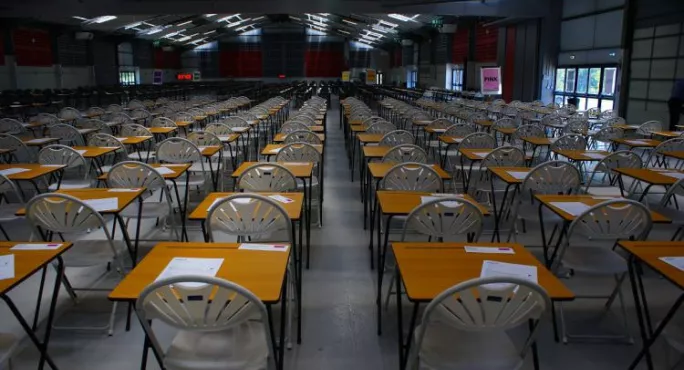- Home
- GCSE resits: Pass rate down in maths, but up in English
GCSE resits: Pass rate down in maths, but up in English

The proportion of students aged 17 and above who achieved a grade C in the final legacy GCSE maths exams has fallen sharply, official figures reveal.
Out of the 149,537 older students across the UK who sat their legacy GCSE maths exams this summer, only 24.4 per cent managed to achieve a grade C or better - a drop of 5.1 percentage points compared with last year. Meanwhile, in English 29 per cent of 17-plus learners achieved an A*-C pass, up from 26.9 per cent in 2016. Some 59,558 entries were recorded in th esubject, down by more than 50 per cent from last year.
This summer was the final opportunity for students to resit the older version of GCSEs (graded A*-G) and also brought the first sittings of the new, linear GCSEs (graded from 9-1) in English and maths. Due to the condition of funding rule for colleges, students who have failed to reach a grade C or 4 in either of the subjects will have to start again next month with the reformed GCSE programme.
And according to figures released by the Joint Council for Qualifications this morning, over 74,000 students aged 17 and above received a D grade across the two subjects. Those who progress to college next month will be required to resit the subject.
Reformed GCSEs
Meanwhile, 88,406 17-plus learners sat the new English exam, with a third (35.5 per cent) achieving a grade 4 - the “standard” pass that students need to avoid a resit - or better, while in maths 37 per cent of the 30,408 entries achieved at least a grade 4.
Across all GCSE entries in English and maths, more than 211,000 students received a grade 3 in their exams, meaning that if they enroll at a college next year they effectively face a compulsory resit of their GCSEs.
Mark Bedlow, director of regulation and business performance at awarding OCR, told Tes that the results for 17-plus students reflected their “varied” abilities.
“I think what will be seen is that…year on year, the abilities of 17-year-olds [do] vary quite significantly, so what we have seen this year is that improvement in the results achieved by 17-year-olds for English language, and that was quite notable,” Mr Bedlow said. “Conversely, we have seen that in mathematics [there has been] a slight decrease in performance. So we are seeing that difference year-on-year and that really is a reflection of the cohort that is coming through.”
Kirsti Lord, deputy chief executive of the Association of Colleges, said: “Today’s GCSE results see the first new style of 9-1 grading in English and maths, which will take some time for everyone to get used to.
“English and maths is a challenge for colleges. That’s why the 6 per cent in English pass rate increase [across both the 9-1 and A*-G versions of the qualifications] for those aged 17 and over is welcome news. It is disappointing that this trend didn’t continue with maths, which has seen a 3 per cent decrease.
“Colleges will continue to face the English and maths challenge while the government insists on 16- to 18-year-old students who haven’t achieved a grade C/4 at GCSE resitting the exam. After four years of putting students through GCSE resits, colleges can confirm that the policy does not work and is an obstacle to the ambition that we all share. The government and educators must work together to deliver the right form of study which benefits students and sets them up with the right skills and knowledge to help in their chosen career.”
Alarm Bells
Jonathan Shaw, CEO of the thinktank Policy Connect, said news that more than 211,000 learners will face mandatory GCSE resits next year “must sound alarm bells at the Department for Education”.
“Our collaborative research has found that the policy has not benefitted learners or the economy at large,” Mr Shaw said. “The recurring cycle of resits dents the confidence of learners and does not encourage them to attain the skills and qualifications they need to succeed and thrive.
“We call on the DfE to implement a post-16 modular GCSE, or a functional skills GCSE with applied English and maths, for all learners instead. This would guarantee a skilled workforce moving confidently into the world of work, and contributing to the economy.”
Concerns about resits were also raised by the Association of Employment and Learning Providers today, which has called for the policy to be scrapped.
Want to keep up with the latest education news and opinion? Follow Tes FE News on Twitter, like us on Facebook and follow us on LinkedIn
Keep reading for just £1 per month
You've reached your limit of free articles this month. Subscribe for £1 per month for three months and get:
- Unlimited access to all Tes magazine content
- Exclusive subscriber-only stories
- Award-winning email newsletters



